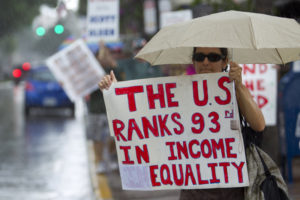Retailers Use Databases to Track and Exclude Workers
Retailers across the country have created a database of workers accused of stealing and are using the information to deprive those people of jobs.
Retailers across the country have created a database of workers accused of stealing and are using the information to deprive those people of jobs.
The databases have tens of thousands of subscribers and are used by companies like Target, CVS and Family Dollar. The latest figures (2011) showing losses due to employee theft, reported by the trade group National Retail Federation, come to roughly 44 percent of missing merchandise valued at $15 billion.
Labor lawyers and federal regulators are properly concerned that the databases can be used to do people harm. Employees who have not committed a theft can be swept up in the count. They are sometimes oblivious that they have admitted to stealing after being questioned by store security officers, and have no clue their records, which often contain scant details, will be stored in databases.
“Employees are often willing to say anything to ward off what can feel like an interrogation,” lawyers told The New York Times. “Another problem: the employee is informally accused and ultimately deprived of the protections, like due process, that a suspect would receive in a police precinct, for example. Lawyers also say that admission forms do not typically warn employees that it will go on their record.”
The databases are another example of a two-tiered justice system in which ordinary Americans can be devastated for life for just the suspicion that they have committed petty crimes. Meanwhile, real criminals — men and women in the banking industry who profit spectacularly off of destroying the economy, for example — continue their lives undisturbed.
William Greenblatt, the chief executive of the background-check company Sterling Infosystems, refuses to endorse the database. “That is not a product that we sell, because I think it’s a product fraught with risk and inefficiency,” he told The New York Times.
Richard Mellor, the National Retail Federation’s vice president for loss prevention, said that even with mistakes, “your options for getting it out of a database are slim.”
— Posted by Alexander Reed Kelly.
Your support matters…The New York Times:
For Keesha Goode, $34.97 in missing merchandise was enough to destroy her future in retailing.
Ms. Goode, 28, was a clerk at the discount store Forman Mills in 2008, when she was accused of not ringing up a former employee’s purchases. During a nearly two-hour examination, Ms. Goode, who maintains her innocence, said she had agreed to write out a statement because she worried she would be sent to jail.
In looping cursive, she said her accusers were trying to make her out as a liar, adding, “I was just doing my job.” Ms. Goode was immediately fired, and was asked to pay back the $34.97. She had no idea, she said, that the statement would go into a shared database.
She received a letter from Dollar General alerting her that she had been turned down for a job partly because of her listing in Esteem, and a copy of the report showed that she had a “verified admission” for “theft of merchandise.” She wrote LexisNexis, “I was accused of not reporting on a former employee who was stealing merchandise, but I did not steal anything myself.”
Independent journalism is under threat and overshadowed by heavily funded mainstream media.
You can help level the playing field. Become a member.
Your tax-deductible contribution keeps us digging beneath the headlines to give you thought-provoking, investigative reporting and analysis that unearths what's really happening- without compromise.
Give today to support our courageous, independent journalists.








You need to be a supporter to comment.
There are currently no responses to this article.
Be the first to respond.